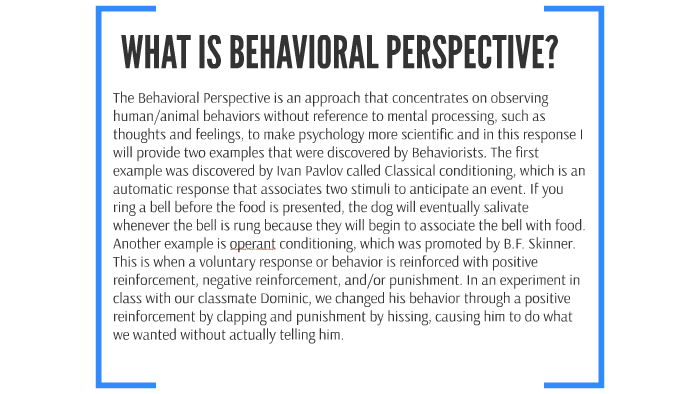Introduction
Throughout history, humans have endeavored to understand the intricacies of personality. One dominant perspective that has emerged in the field of psychology is the behavioral perspective. Unlike other approaches that delve into internal thoughts and emotions, the behavioral perspective takes a radically different approach by focusing solely on observable behaviors. In this extensive and informative article, we will delve into the fundamental principles, applications, and implications of the behavioral perspective on personality, empowering you with a comprehensive understanding of this influential psychological framework.

Image: prezi.com
Unveiling the Essence of the Behavioral Perspective
The behavioral perspective, spearheaded by pioneering psychologists such as John B. Watson and B.F. Skinner, asserts that personality is shaped primarily by environmental influences rather than innate traits or unconscious processes. This perspective emphasizes the importance of observable behaviors, advocating that these behaviors are learned through interactions with the environment. In essence, behavioral theorists contend that personality is not fixed but rather a product of conditioning and reinforcement.
The Building Blocks: Classical and Operant Conditioning
Central to the behavioral perspective are the concepts of classical and operant conditioning. Classical conditioning, first demonstrated by Ivan Pavlov, involves associating a neutral stimulus with a meaningful one, eventually leading the neutral stimulus to elicit a conditioned response. In operant conditioning, proposed by B.F. Skinner, behaviors are reinforced or punished based on their consequences, influencing the likelihood of their repetition. These fundamental principles form the cornerstone of the behavioral perspective, guiding its understanding of personality development.
Shaping Personality Through Reinforcement and Punishment
The behavioral perspective places significant emphasis on reinforcement and punishment as the driving forces behind personality formation. Reinforcement, whether positive or negative, increases the probability of a behavior being repeated. Positive reinforcement involves rewarding desired behaviors with pleasant consequences, while negative reinforcement removes or avoids unpleasant consequences. Punishment, on the other hand, decreases the likelihood of a behavior occurring. By employing these techniques, individuals can mold their own behaviors and those of others, shaping personality over time.

Image: www.youtube.com
Applications in Real-Life Settings
The principles of the behavioral perspective have far-reaching applications in various real-life settings. In educational institutions, teachers utilize reinforcement strategies to encourage positive student behaviors and promote academic progress. Similarly, in clinical psychology, behavioral interventions are employed to modify maladaptive behaviors and establish more constructive coping mechanisms. The behavioral perspective has also made significant contributions to organizational behavior, guiding the design of effective training programs and performance management systems.
The Impact of Environment and Social Learning
The behavioral perspective underscores the profound influence of the environment on personality development. Social learning theory, proposed by Albert Bandura, emphasizes the role of observation and imitation in shaping behaviors. Individuals observe the behaviors of others, particularly those within their social circles, and may adopt these behaviors if they are perceived as beneficial or rewarding. This process of social learning plays a significant role in the transmission of cultural norms and values, contributing to the formation of shared personality traits within society.
Ethical Considerations: Shaping Behavior Responsibly
While the behavioral perspective offers powerful tools for shaping behavior, it is crucial to consider its ethical implications. Critics have raised concerns about the potential for manipulation and control through the use of reinforcement and punishment. It is essential to employ these techniques ethically, with respect for individual autonomy and well-being. Psychologists must carefully weigh the benefits and risks of behavioral interventions, ensuring that they are used for socially responsible purposes and within appropriate boundaries.
What Is The Main Idea Of Behavioral Perspective On Personality
Conclusion: A Valuable Perspective for Understanding Human Behavior
The behavioral perspective on personality provides a unique and valuable lens through which to understand human behavior. By focusing on observable behaviors and the role of environmental influences, this perspective has revolutionized our understanding of personality development. Its principles have found widespread applications in education, therapy, organizational behavior, and other fields, empowering individuals to modify their own behaviors and positively shape their lives. However, it is essential to exercise ethical considerations when employing behavioral techniques, ensuring their responsible and beneficial use for the betterment of society.